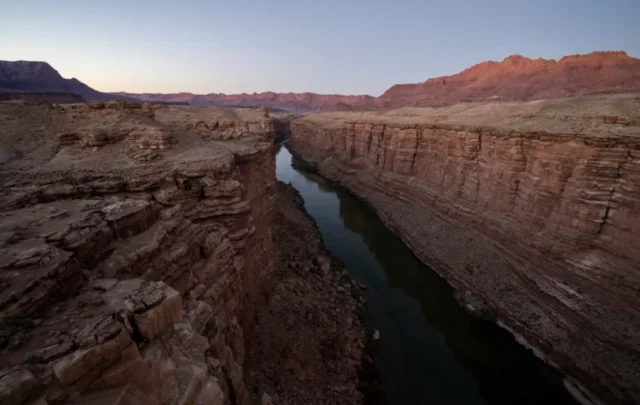Click on the headline (link) for the full text.
Many more articles are available through the Energy Bulletin homepage
Implications of “Peak Oil” for Atmospheric CO2 and Climate
Chris Vernon, The Oil Drum: Europe
The title is that of a paper recently (20th April 2007) submitted by James Hansen and Pushker Kharecha. The complete paper can be downloaded here:
Implications of “Peak Oil” for Atmospheric CO2 and Climate
James Hansen is a physicist, adjunct professor: Earth and Environmental Sciences, Columbia University and director: NASA’s Goddard Institute for Space Science. Outside the scientific community Hansen is probably best known for accusing the Bush administration of trying to silence him after he gave a lecture in December 2005 calling for prompt reductions in emissions of greenhouse gases linked to global warming.
In this paper Hansen and Kharecha consider “realistic” (they use EIA data) reserves for oil and gas and conclude that due to approaching peaks it is feasible to keep atmospheric CO2 from exceeding approximately 450ppm as long as coal and unconventional fossil fuels are used responsibly.
Introduction
The twin problems of peak oil and climate change are rarely considered with respect to one another, in fact some leading climate change campaigners advocate not talking about peak oil at all (see George Monbiot’s recent speech here and my response here). The problems are closely related and the best course of action must fully consider the best thinking on both subjects. For this reason I applaud Hansen as one of the very few climate scientists who does fully integrate an understanding of peak oil (and gas) into his work on climate change.
In this paper Hansen briefly introduces Hubbert’s notion of peaking oil production rates when about half of the economically recoverable resource has been exploited, going on to mention subsequent work highlighting geological and geographical constraints that similarly lead to the pattern of growth, a production peak followed by declining production of minerals, natural gas and coal.
This seemingly obvious fact of life does not feature largely in today’s studies of climate change…
(22 May 2007)
Chris Vernon summarizes recent attempts to integrate thinking about peak oil and climate change, including Kjell Aleklett’s recent article. -BA
Peak Oil – Films to Wake the Sleeping
Aaron Wissner, LiveJournal
Gas prices getting you down? Having trouble explaining high gas prices to family, friends and community? Don’t fret, because recent film releases can provide an excellent vehicle for waking the sleeping and helping people see how peak oil is already impacting their lives.
Peak oil is the primary cause of increasing gasoline prices. The demand for gasoline is increasing rapidly, while the oil supply is within a few years or months of decreasing. As the oil supply begins its permanent decline, gasoline prices will rise, but may be the least of our worries. Global food production is extremely dependent on oil, as is our monetary system. Many individuals are exclaiming that peak oil will lead to the collapse of civilization. The truth is, no one seems to know exactly how this will impact the world At the same time, the probability of a global crisis doesn’t have to be very high before it is worth learning about.
One fantastic method of learning about this topic, and for sharing this information with others, is hosting an event to “premiere” or “screen” one of these films. After the show, provide structured time for discussion with a skilled moderator, preferably one familiar with peak oil. To keep the conversation going, announce the screening of another of these films. This is not only a positive educational activity, but it can be very enjoyable to have a truly important conversation with family, friends and community.
I have watched most of the films listed below. They are sorted in each category based on their applicability to peak oil. For more information on peak oil, feed free to read my blog, or simply go to google and search on “peak oil”.
(22 May 2007)
International Energy Outlook of the EIA/DOE is released
Energy Information Administration (EIA)
Contributor Sohbet Karbuz writes:
The International Energy Outlook of the Energy Information Administration/DOE has been released
Press release: www.eia.doe.gov/neic/press/press283.html
The report: www.eia.doe.gov/oiaf/ieo/index.html
powerpoint presentation is at: www.eia.doe.gov/neic/speeches/caruso052107.ppt
An important message in the report which will probably not get much attention is that coal is the fastest-growing energy source worldwide in the IEO2007 reference case.
It is interesting that EIA revised contantly downwards its world natural gas consumption forecasts over the past years. World natural gas consumption estimate in IEO2007 for 2030 is 163 TCF. This is lower than what IEO2000 estimated for
(22 May 2007)
Man-in-the-street reporter bumps into “Peak Oil Man”
Byron W. King, Whiskey & Gunpowder
So I drove into town and parked. And there I was, walking out of the Mellon Garage, minding my own business, when some guy walked up to me and said, “Hi, can you do an interview?”
“What do you want to talk about?” I asked.
“The price of gasoline,” he replied.
“The price of gasoline?” I said. “How interesting. Whom do you work for?” I asked.
The man replied that he works as a stringer for a national press outlet, meaning that he writes articles and gets paid by his wire service if an article gets picked up. He wanted to talk, as he put it, “with a man in the street.” Little did this fellow know or suspect that he had picked “Peak Oil Man.”
“Well, OK,” I said. “What would you like to know?”
“Gasoline is up to $3 and more per gallon. What do you think about the hardship of people paying more for gas?” he asked.
“Hardship?” I said. “I think that at $3 per gallon, gasoline is still pretty cheap, compared with its true value.”
I do not think that mine was the answer that the reporter was expecting to hear. “What do you mean? What is the true value of gasoline?” he asked.
“Do the math,” I replied. “$3 per gallon of gasoline is less than 19 cents per cup. What would you pay for a cup of coffee at McDonald’s or Starbucks? What do you pay for a gallon of Coca-Cola?”
…The reporter knew by now that he was talking about oil and refined product with someone who knows something about the business. He paused and thought for a moment. Then he asked, “So why is the price of gas rising?”
“The price of gas is rising,” said the Peak Oil correspondent, “because there are more people buying it than there are selling it. And there will be, for the rest of your life.”
Thus ended a random interview with a man in the street.
(22 May 2007)





